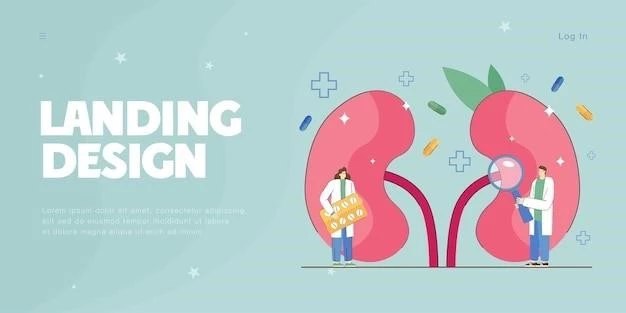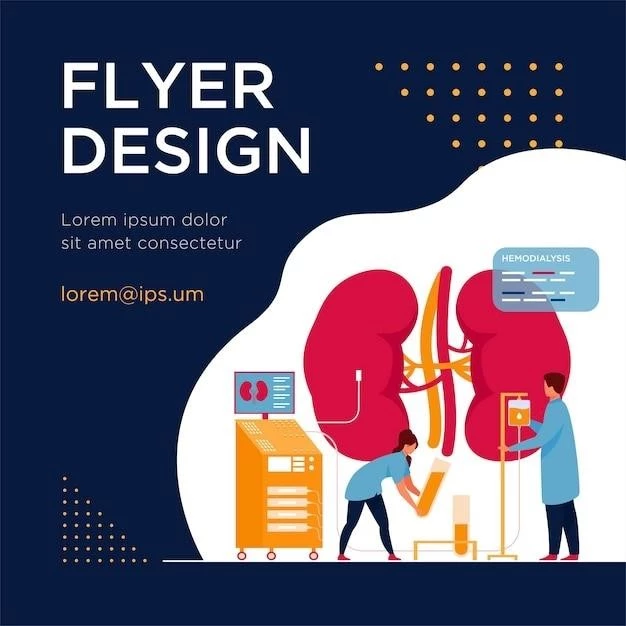Congenital Kidney Disorder⁚ A Comprehensive Guide
Understanding the symptoms of congenital kidney disorder is crucial for early detection; Explore treatment options that can help manage the condition effectively. Dive into the causes and get informed on how diagnosis works. Learn about preventive measures to safeguard against the disorder.
Symptoms of Congenital Kidney Disorder
Congenital kidney disorder may present with various symptoms‚ including high blood pressure‚ edema‚ frequent urination‚ blood in urine‚ back pain‚ and fatigue. Monitoring these signs is vital for early intervention. Seek medical attention promptly if you experience any of these symptoms.
Treatment Options for Congenital Kidney Disorder
Managing congenital kidney disorder involves a personalized treatment plan tailored to individual needs. Options may include medication to control blood pressure‚ dietary changes‚ dialysis‚ and in severe cases‚ kidney transplant. Consult with a nephrologist to discuss the most suitable treatment approach for your specific condition.
Causes of Congenital Kidney Disorder
Congenital kidney disorder can arise from genetic mutations‚ prenatal factors like maternal drug use or infections‚ or structural abnormalities in the kidneys from birth. Understanding the underlying causes is key in managing and treating the condition effectively. Genetic counseling can also provide valuable insights into the potential causes of congenital kidney disorders.
Diagnosis of Congenital Kidney Disorder
Diagnosing congenital kidney disorder typically involves a combination of physical exams‚ blood tests‚ urine tests‚ imaging studies like ultrasounds‚ and genetic testing. These diagnostic tools help healthcare providers assess kidney function‚ identify underlying causes‚ and determine the best course of treatment. It is essential to undergo these diagnostic tests as recommended by your medical team for proper management of the condition.
Prevention of Congenital Kidney Disorder
While congenital kidney disorders have genetic and prenatal factors that may not always be preventable‚ there are steps that can be taken to minimize risk. These include maintaining a healthy lifestyle‚ avoiding harmful substances during pregnancy‚ staying hydrated‚ managing chronic conditions‚ and attending prenatal care appointments regularly. By prioritizing healthy habits and seeking appropriate medical guidance‚ you can help reduce the likelihood of congenital kidney disorders.

Congenital Kidney Disorder in Children
Congenital kidney disorders in children require special attention and care. Early detection is crucial‚ so parents should be aware of potential symptoms like urinary issues‚ growth delays‚ or abdominal pain. Prompt medical evaluation and monitoring are essential to ensure appropriate treatment and support for the child’s kidney health. Collaborating closely with pediatric nephrologists will help manage the condition effectively and improve the child’s quality of life.
Congenital Kidney Disorder Complications
Congenital kidney disorders can lead to various complications such as chronic kidney disease‚ high blood pressure‚ electrolyte imbalances‚ urinary tract infections‚ and developmental issues in children. These complications may require additional treatments‚ lifestyle modifications‚ and regular monitoring to manage effectively. It’s crucial to address complications promptly with medical professionals to prevent further kidney damage and improve overall health outcomes.
Living with Congenital Kidney Disorder
Living with congenital kidney disorder requires a comprehensive approach that includes following a tailored treatment plan‚ managing symptoms‚ maintaining a healthy lifestyle‚ attending regular medical check-ups‚ and seeking support from healthcare providers and support groups. It’s essential to prioritize self-care‚ adhere to prescribed medications‚ stay informed about the condition‚ and communicate openly with your healthcare team to optimize kidney health and overall well-being.
